The Walking Dead Interview: Meet The Governor, David Morrissey
An SFXclusive interview with the The Governor ahead of his debut on the The Walking Dead. He also talks about his memorable appearance as “The Next Doctor”
The Walking Dead season three sees the highly-anticipated debut of the comic series’ most notorious villain – The Governor. To find out what to expect from the small screen version of the character we spoke to the actor who plays him, David Morrissey about empathy for the devil and how his experience as “The Next Doctor” in Doctor Who prepared him for The Walking Dead .
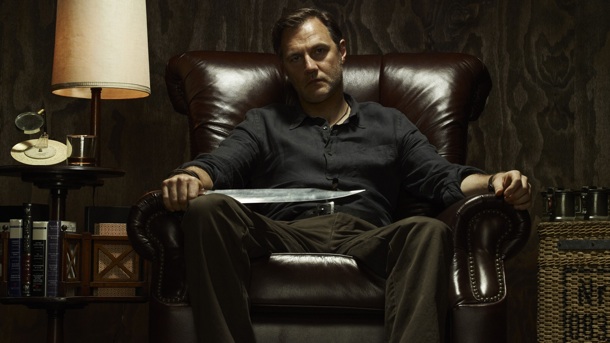
SFX : So we understand when you were cast as The Governor the first thing you did was read the prequel novel...
David Morrissey: “I did, I read Rise Of The Governor by Robert Kirkman. I’m not a graphic novel fan. It’s not something that’s got me, really. And also the graphic novel showed me where The Governor was going, and I wanted to know where he’d been. That’s what all my questions were about – how did he get to this place, emotionally as well as physically. And Robert said, ‘Have a read of that.’ And I said, “Okay.” It’s a brilliant book. It deals with a group of people in the very early days of the crisis and that character and that world started to give me the basis of the character really. And then the writers came in with stuff. So after I read the novel I went and sat with them and we talked about how the character would develop through the series. And of course I wanted to give him complexity and motivation for the things he did.
“Then I read the comic book and what happens in the comic book is he arrives fully-formed. He’s quite sadistic off the bat. He’s very out there and dark and evil. My thing was I wanted to explore the ground in-between The Rise Of The Governor finishing and the comic book starting. There’s a whole lot of history right in the middle of that that I felt was very interesting that I wanted the character to explore.”
How much of your Governor is from the page, and how much is what you’ve brought to it?
“I think there’s quite a lot of me bringing stuff to it. They’ve given me the character that they have been working on for a while now and it’s about me shaping what they have given me. When people talk about him as a villain and evil, they’re terms that you put on to people, and you give to their motivations, whereas people don’t tend to think of themselves in that way. They might think of themselves as uncaring or they might have a block about caring for you, or a sadistic sense of themselves, but I think they have a reason behind what they’re doing. My whole thing with The Governor was making sure he did things for his good reasons, that they were absolutely paramount for him, and necessary for him to function, and his community to function. And I think we’ve done that.”
Then do you empathise with him?
Get sneak previews, exclusive competitions and details of special events each month!
“You don’t have to sympathise with him, but I have to empathise with him. I have to make sure I know that everything around him is right for him making the decisions he makes, so if he has an element of paranoia about him, I have to make sure that is there and it’s real for him. If there’s an element of insecurity about him: why is that? I think he’s driven by fear, which in this world isn’t a bad thing; everybody is driven by fear. But you meet him in a very successful place. He is physically in a successful place because he is in a secure village that he’s made secure. He’s built walls around it. Your kids can run out in the street and you don’t have to go crazy and run after them, you can let them do that because in this world he has created safety and security.
“But he’s also in an emotionally secure state because he is a successful leader. He’s created this for his people. And what that gives him, unlike Rick, is it gives him time that he can contemplate, that he can think about the future, that he can build and plan and think about where we will go as a race. Rick doesn’t have time. He just has to get through today, particularly after where we left him at the end of season two. He’s nomadic and has no roots at all. He’s just trying to make sure everyone survives for the next 24 hours looking for quick shelter and quick food. Whereas The Governor has an infrastructure that works, so he’s successful. But also, that gives him power, and power is a terribly corruptive influence and he’s not immune to that. I don’t think he in any way has a god-like status, but he certainly has an idea of himself which is about rebuilding the world.”
How does Rick and the gang coming in affect that ideal situation?
“The Governor has his own place and his own idea of himself in the place that he plays up to. I don’t think he existed with that much power and security before the world went to shit. I don’t think he had that. The situation has given him that, so it’s a relatively new position for him, which he’s enjoying. Woodbury has a hierarchical way of working and he’s at the top. Any other group that comes in will have to work within that hierarchical group, but of course sometimes that doesn’t work! So it’s that type of oil in the water thing, that’s what we deal with this season, and that’s what’s interesting.”
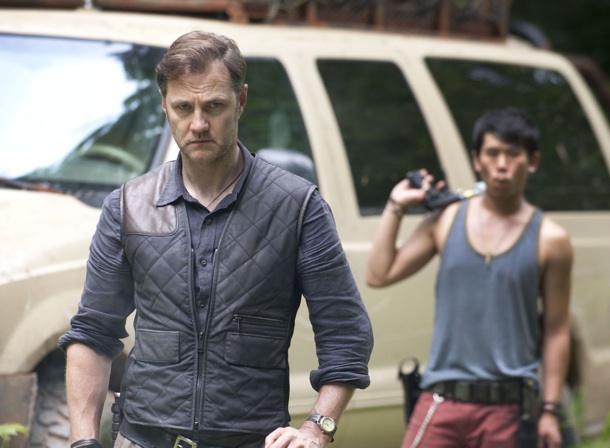
Because people have read the comics and they think they know where this character is going to end up, are there going to be surprises?
“Yeah, big, big surprises. It will be interesting to see how he lands with fans. I was at Comic Con in New York and people were saying, ‘You’re playing this bad ass guy!’ And I was like, ‘Oh, okay, you’ll just have to wait and see.’ As I said, what’s interesting for me is exploring the ground before he arrived in that comic. And I think it’s important that when he goes off into the world and comes into the world of The Walking Dead TV show he is a character that is complex. The character in the graphic novel, if you arrived in the TV show as that character you have a very short shelf life, you could hit a creative ceiling very quickly there.
“It’s also important to say the other characters in the show have a relationship to The Governor that is very different to the relationship he has with the audience. The audience see him in his private moments and those private moments can be all different types of emotions, but you have a personal relationship with him that nobody else in the show has. And that’s different from the comic. So it’s going to be interesting, but my responsibility, of course, is to the TV show and the character in the TV show. The comic book is out there, you just have to get on with that.”
How has your experience been with The Walking Dead ’s rabid fanbase?
“At the moment I’m in this sort of bubble because people know I’m playing the role, but it hasn’t hit the screens yet. So when I went to San Diego Comic Con, on the first day I was with Andy, Laurie Holden and Laurie Cohan, I think. We went down and people went crazy for us, screaming at us as we were driving along outside the hotel. It was like being with a rock band. I’m a big fan, so I’m in there, driving along like the roadie.
“So we get there and I said to one of the girls who was looking after us, ‘Can I go on the floor and have a look round? No one knows me yet so it’s fine.’ So, I went out onto the convention floor and was walking round fine, no one troubles me at all, until I get to the Doctor Who stand and there’s lots of Doctor Who fans and they get me. Then you sit down and you do a signing, these things go round the table for you to sign, and you suddenly saw how much the fans love the show. Really love it. And have ownership of it. That’s going to be interesting for me, but I love the fact they are involved in the show so much, and care about it, care about the people in there, and that’s a great place to be. Season three just opened in America and got the biggest audience of any cable show in the history of American television, which is just phenomenal, and that’s because the fans really engage with the show in a very caring way. They really care what happens to those characters and I love that.”
ON THE NEXT PAGE: David Morrissey reveals how his Doctor Who experience prepared him for the The Walking Dead in an unexpected way…
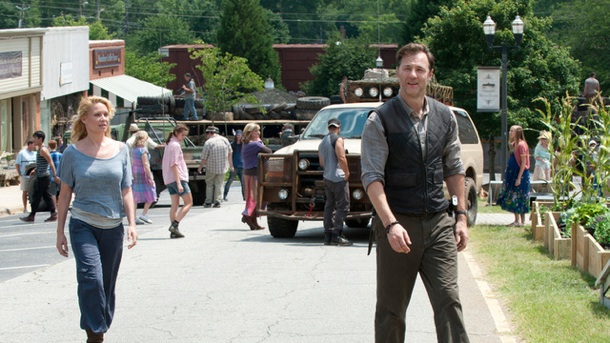
Does that put any pressure on you portraying this character that’s so important to them?
“I think any job I do I put myself under pressure. I really do. This job to me doesn’t feel any different to any other job I do. Then, every other job I do is quite pressurised. I do feel great pressure and I feel great responsibility, but I always do, so it’s not different, but it’s pretty out there. The only difference for me is being a new character that hasn’t been seen yet. I’m in a slight limbo at the moment waiting for him to appear on screen, but I love the character, I love playing him and I love being in the show, so obviously there’s a little apprehension about it. But I think what he goes through in 16 episodes is so brilliant, so I think it will be fine.”
You’ve been in a couple of genre shows before ; Doctor Who you already mentioned. Is it a genre that appeals to you personally?
“I wasn’t really involved in the zombie world, or the vampire world or anything like that in that way. I did love Nosferatu and I did like the Hammer world. Zombies, not so much really, I don’t know why, it just never struck me... apart from Shaun Of The Dead , which I thought was a work of genius. And the great thing about the show is it’s not just a zombie show. When I watched that pilot and I’d seen some of the trailers and thought, ‘Hmm, that looks interesting.’ But when I watched it I realised that actually it is about humanity and survival and it’s full of those big questions about what would you do if you were under attack with your nearest and dearest... They’re living in a warzone these people. They’re living in this really unstable, dangerous challenging world. So I took it as the story rather than a genre thing. In my naivety that’s been the surprise of it, ‘Oh, this is a big genre show, I see, I thought it was a drama.’
“Certainly Doctor Who was different because it was the Christmas special, which we filmed in February, of course. It was called ‘The Next Doctor’, and just as they finished that series David Tenant announced he was leaving, so Russell (T Davies) said to me, ‘Listen, we’re going to spread this rumour that you’re going to be the next Doctor, are you happy with that?’ And I went, ‘Yeah, great.’ And he said, ‘But you can’t tell anyone.’ And I said, “Okay, fine, I can tell my kids though.’ And he went, ‘No, because they’ll tell someone in the playground.’
“So for the best part of a year they were saying, ‘Are we moving to Cardiff?’ And I was like, ‘I can’t tell you that.’ So that high level of secrecy and that cauldron of heat around something I’ve been used to for a while. And this show is full of that. It’s a really hard show to promote because people are saying, ‘What happens here?’ And then you go, ‘I can’t tell you.’ That is difficult really, the idea of spoilers. Again with my kids they say, ‘So what happens in this?’ ‘I can’t tell you. Not that I don’t trust you.’ When they come for a set visit they have to sign a secrecy thing and they can see some things, but not others, and quite rightly there’s a great security around the show, but that’s the joy of it as it goes out.”
You’ve read the comics now. The Governor goes to some really dark places. Would you like to see your version of The Governor go to those extremes?
“Yeah, I have no problem with any characters behaving in an extreme way. Or behaving in a brutal way as long as there’s reasons behind it I can justify. And they can be as brutal as anything, if I can justify them. And I think that’s true of the show and the writers are always looking out for that as well. This season certainly explores that, so it is about what makes us behave in certain ways? Why do we do this? I played a character a couple of years ago who was based on a real man who tortured Winnie Mandela in South Africa, and that was me asking, ‘Okay, what was the fear behind these guys? Why did they interrogate people in this way? Why did they brutalise people in this way?’ And it’s to do with fear of self, a fear you yourself will be exterminated by your enemy. You have to demonise your enemy in some way and even though to us it’s abhorrent, and we find it unforgivable, quite rightly, for you doing it you have some sort of sense around it, and that’s what I have to find inside my character.”
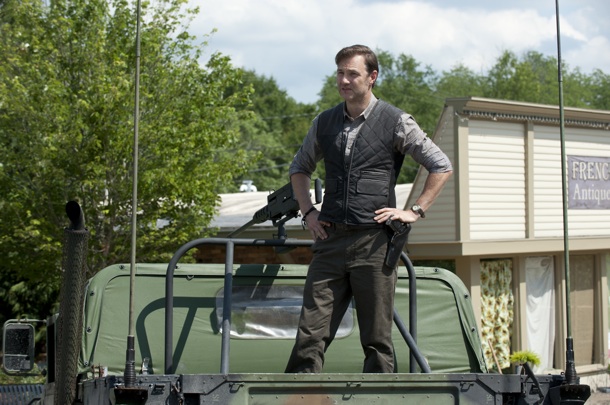
Is there much British camaraderie on set now that the two pivotal characters in one of the most popular shows in America are both played by British actors?
“There’s not really. What happens is, we are great friends, me and Andrew, so it means living in Atlanta is easier. Atlanta’s a great place, and I really love being there, but having Andy there, and his family, they’ve been there for two years now, they know all the places. So I can ring him up and go, ‘Do you know anyone who does a good massage?’ And he’ll say, ‘Yeah, go here.’ So he knows that, where to live, things like that. So that’s been invaluable for me as a person and made me terribly happy, which is obviously terribly important because it’s for my family as well.
“On set, it’s very different because Andy’s in accent all the time. We both stay in accent all the time, so there’s not a British thing going on. What there is for me is... it’s to do with the fact that he is a fantastic leading actor, and he reminds me of Tennant in that way in the sense that Andy leads from the front. He’s the first man on set, he’s totally committed. He eats, sleeps and drinks this show; he absolutely loves everything about it. He cares, with all his heart about what’s going on. He knows everyone on the unit and is in touch with everyone, is personalised with everyone, so his commitment to it, his work ethic, his professionalism, that filters down not just with the actors, but with everyone. And that’s exactly what David did, they take ownership of it.
“So for me and the other actors seeing Andy and for all the crew seeing how he works, he sets that example and that benchmark and we have to come up to that. So there’s nothing British about that, that’s just the leading actor. So there’s Andy as the actor on set, which is just a joy to be with, but there’s not a lot of friendship there. It’s just fellow actors doing their job. And then there’s Andy in our downtime when we go and play golf and get together and eat, and stuff like that. That’s your friendship over there. He leads the show brilliantly, but it’s not a Brit thing.”
What are your hopes for the way the Governor is seen?
“I don’t know about that. I just want them to enjoy the show and to add to the show. That’s my hope. My hope is that it contributes to an already brilliant production. That’s it really. I love it. It’s been a blast for me in the last year. He’s a great character and it’s a brilliant show, so I just hope it works and people enjoy it, but it doesn’t lessen the fact I’m having a great time whatever happens. But I’m hoping it will land well.”
The Walking Dead airs in the UK every Friday at 10pm on FX.
• Catch up on our Walking Dead Season Three reviews .
• And once you’re caught up, pop out and buy our packed Walking Dead bookazine .
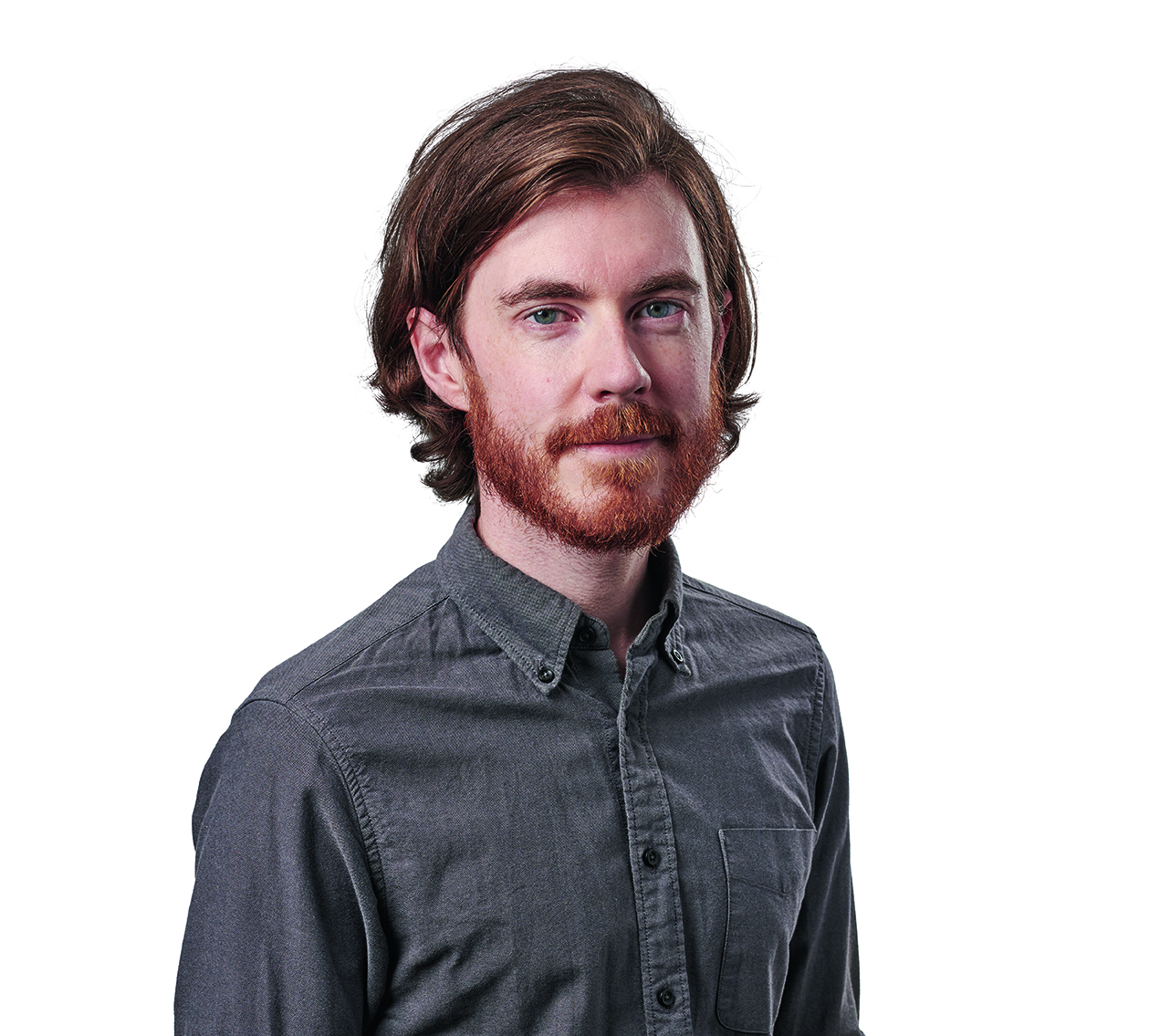
I'm the Managing Editor, Entertainment here at GamesRadar+, overseeing the site's film and TV coverage. In a previous life as a print dinosaur, I was the Deputy Editor of Total Film magazine, and the news editor at SFX magazine. Fun fact: two of my favourite films released on the same day - Blade Runner and The Thing.


